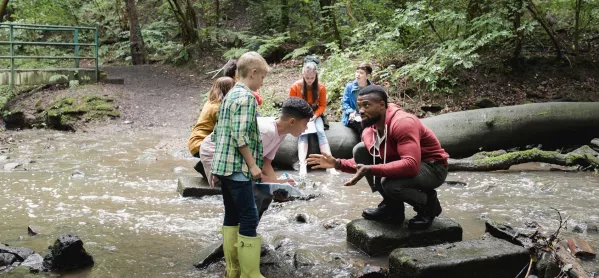
- Home
- 5 ways to focus on outdoor learning throughout primary
5 ways to focus on outdoor learning throughout primary

Outdoor learning rarely lasts much beyond early years education. But why does this happen?
After all, it is well documented that outdoor learning improves the physical and mental wellbeing of children and teachers, as well as nurturing creativity, improving engagement, developing environmental awareness and many more benefits.
Early years: How to make outdoor nurseries work
Learning: Outdoor learning ‘makes lessons more memorable’
Watch: 5 ways to create a healthy school
These all join up to enhance a pupil’s overall enjoyment of their time in school.
With this in mind, our school has taken an approach to outdoor learning from the perspective of supporting pupils’ development of self-confidence, resilience and independence, while helping them to keep physically and mentally healthy.
Linking outdoor learning to PSHE meant developing an approach that would meet the requirements of a national curriculum subject within a broader remit.
Furthermore, we had to be aware of our specific school resources and pupils’ needs, including the following:
- A school grounds with limited natural resources, trees or wild spaces.
- The need for a whole class of 30 to be taught together outdoors with teacher and assistant.
- Limited budget, meaning resources had to be found within the school.
- Activities offering risk and challenge would need to be created with few resources (for example, using saws, ropes and logs).
- As we had no specialised outdoor programme, staff would have to use personal strengths to create sessions.
- We would provide a a scrapbook for children to record their activities however they chose to - encouraging reflection and individualised recording.
- Offering teachers the freedom to innovate an outdoor learning curriculum would enhance cross-curricular learning opportunities.
- Activities would start with children’s PSHE needs so that a learning objective could be adjusted as a focus developed.
It is this last point that is particularly noteworthy. Focusing on a child’s needs means all activities begin with an issue they find challenging in school or personally.
For example, the British values and citizenship strand linked to school behaviour expectations, which became a focus when necessary, and certainly enhanced environmental awareness and action. Each session combined informal discussion, group work or games, using tools and making items.
The planning could be adjusted and feedback was provided as a comment in pupils’ scrapbooks. We noted, for example, that behaviour and concentration was maintained along with teamwork as all pupils engaged at their level.
If more teachers realised the beneficial possibilities presented by outdoor learning within a “broad and balanced curriculum”, then more value might be placed on this teaching approach to achieve curricular aims and provide greater equity.
Furthermore, taking a realistic view of what we could offer pupils meant we were able to overcome, or side-step, many of the perceived barriers to outdoor learning for upper primary children. You can do the same by taking the following steps:
1. Make time for outdoor learning among other curricular demands
We timetabled an afternoon once per week dedicated to outdoor learning. We were able to find this time by being honest about how we could merge outdoor learning into our curriculum. By enabling pupils to learn an outdoor skill - for example, constructing models, whittling, cooking, orienteering, teamwork and nature appreciation - we were taking PSHE objectives to a new dimension and actively supporting pupils’ wellbeing and mental health.
2. Discuss safety issues with pupils
Any focus on outdoor learning will come with an element of risk. As such, it is important that you discuss this with pupils upfront so they understand there are specific rules and expectations of them during outdoor learning. This could involve providing behaviour points for good safety awareness to motivate them to learn.
3. Take advantage of outdoor learning knowledge
Engage staff to find out who has prior outdoor learning experience, or may be willing to attend CPD on this, so that you can benefit from all the skills at your disposal. You never know who might surprise you as being an expert wood whittler or birdhouse builder.
4. Share best practice in your community
We created a website were local staff could communicate ideas and best practice for everyone to learn from. Such a hub is a great way to benefit from your local networks and can lead to some great knowledge sharing.
5. Engage pupils with SEND
Start from the premise that every pupil will have an equal chance of engagement, including those with special educational needs and disabilities (SEND). This may require extra time to consider how you use one-to-one support or even engage with parents to help, but there is no reason that everyone cannot benefit from the huge potential that outdoor learning offers.
Overall, schools should look to engage in outdoor learning regardless of perceived limitations or barriers.
The benefits are such that it’s always worth finding a way to make it work that fits your school.
Alix Marschani is an early years foundation stage and primary teacher and outdoor learning coordinator at Hartsfield JMI School in Hertfordshire. She tweets @AlixMarschani
Register with Tes and you can read five free articles every month, plus you'll have access to our range of award-winning newsletters.
Keep reading for just £4.90 per month
You've reached your limit of free articles this month. Subscribe for £4.90 per month for three months and get:
- Unlimited access to all Tes magazine content
- Exclusive subscriber-only stories
- Award-winning email newsletters
You've reached your limit of free articles this month. Subscribe for £4.90 per month for three months and get:
- Unlimited access to all Tes magazine content
- Exclusive subscriber-only stories
- Award-winning email newsletters